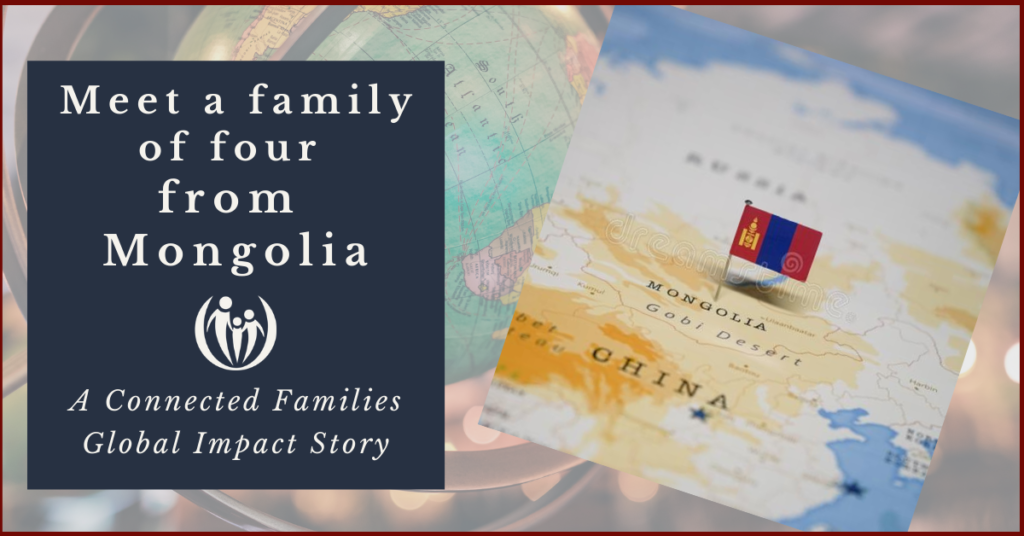
Meet a Family of Four from Mongolia

For nearly twenty years, Connected Families has been equipping and empowering parents to lead their families with grace. As a tumultuous 2020 comes to an end we are excited to introduce you to families around the world who are embracing the Connected Families Framework in their home. Connected Families is transforming, equipping, and inspiring families all over the globe!
Come along as we explore how parents* (one Canadian-born and one American-born) of two children, living and serving in Mongolia, are learning to lead their family with grace, all while being immersed in another culture.
How has Connected Families impacted your parenting journey?
I really struggled as a new mom with little support, postpartum depression, and ministry needs. The Connected Families online course Discipline That Connects with Your Child’s Heart was one of the tools (among others) that God used to bring me back to a place of health and wholeness.
The Connected Families Framework is on our fridge and people ask us about it all the time. We also recommend it to all of our fellow ministry teammates. We have shared the course information with many!
What has been one major take-away you’ve learned from Connected Families and how have you applied it?
Applying the Connected Families Framework, especially making our home a place of safety and refuge for our family, and others who live with us or visit.
Families here are often multigenerational. While the younger generation may feel attracted to the framework, they know that the older generation in their family (who actually do a lot of the parenting due to both parents working) may not be so receptive.
The framework is one that many people from a variety of cultures (Mongolian, German, Kazakh, Russian) have asked us about when they visit and notice it on our fridge. I think it is something that many people have lacked (especially the safety aspect) and see the need for. This has opened the door to many conversations.
Have you had to adjust or tweak the framework in these conversations?
When we share Western resources with our local friends, they usually speak English or have lived abroad and generally know some of the values of Western culture, such as individualism and independence, being individually responsible.
In Mongolia, it is more that the group is responsible as a whole. The concepts of shame and honor connect so closely to the “You are responsible.” level of the framework. Do what we say and it brings honor; but the natural consequence of disobedience is that it brings shame to us all.
We just usually encourage our friends to think about how they can adjust the framework to the Mongolian context since they are the experts on Mongolian culture. That said, the shame side of the culture really impacts parenting here. Because this isn’t addressed too much in the course (as in group shame, not just individual consequences) this has prompted additional conversations.
In your experience, what has been the value of the framework from a culture perspective?
There has been a lot of teaching from Mongolian pastors recently about the parents’ responsibility for their children and their marriage. I think that the current church emphasis here in Mongolia, on biblical marriage as well as parenting, has the potential to help a lot of parents who feel disempowered by cultural values. For example, in Mongolian culture compliance to elders is often the only way to peace. Instead of “leaving and cleaving” as the Bible directs, men tend to give their mothers the primary allegiance in the family. The framework is a simple way to understand family dynamics and work towards a goal together.
*Due to the sensitive nature of this family’s work in Mongolia, we are unable to provide a picture or more details.
Frustrated by constant discipline challenges? Take 15 minutes to read our free ebook 4 Messages All Children Long to Hear: A Discipline That Connects Overview.

